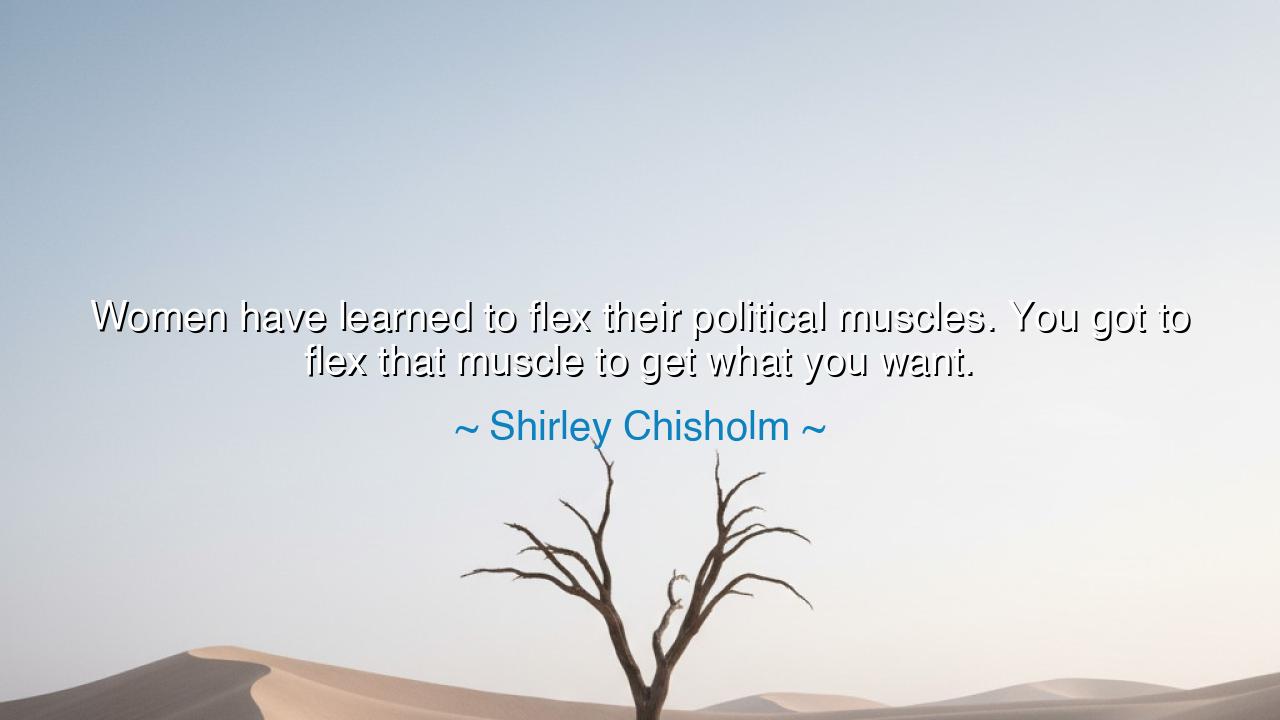
Women have learned to flex their political muscles. You got to
Women have learned to flex their political muscles. You got to flex that muscle to get what you want.






The words of Shirley Chisholm — “Women have learned to flex their political muscles. You got to flex that muscle to get what you want.” — resound like a call to battle, filled with strength and urgency. She reminds us that power is not freely given; it must be claimed, tested, and exercised. By speaking of political muscles, she likens the struggle of women to the discipline of warriors and athletes, where strength grows only through constant effort. To be silent is to remain weak, but to act, to speak, to organize, is to grow strong and to command respect.
The meaning of her words lies in the truth that rights unused are rights easily ignored. Women, long excluded from the councils of power, had to learn not only to enter politics but to wield their presence with force. Chisholm warns that opportunity alone is not enough; one must flex it, stretch it, and press it forward until barriers fall. Just as the body grows through resistance, so too does political power grow through persistence in the face of opposition.
History shines with this lesson. In 1968, Shirley Chisholm herself became the first Black woman elected to the U.S. Congress, and later, in 1972, she ran for president, shattering boundaries that many thought unbreakable. Her campaign, though not victorious in votes, was victorious in vision: it showed women and minorities that they could claim the highest seats of power. She lived the very truth she spoke — flexing her political muscle to inspire others to do the same.
The origin of this declaration rests in Chisholm’s deep understanding of systemic resistance. She had seen how women’s rights, civil rights, and economic justice could be promised but never delivered unless those who hungered for them demanded fulfillment. Her voice was forged in a world where complacency meant invisibility. Thus, she called on women to embrace not passivity but force, not patience alone but persistence — to push against walls until they cracked.
Therefore, O seekers of wisdom, take this charge: do not wait for power to be offered, for the hands of history rarely give freely. Flex your political muscles — in voice, in vote, in action — until your presence cannot be denied. As Shirley Chisholm teaches, strength unused is strength wasted, but strength exercised can transform a people. And when women rise together, flexing their muscles with courage, they do not merely join history — they remake it.






TNPHAM THU NGAN
Chisholm’s perspective on political power for women is inspiring, but I also wonder how it applies in today’s world. Have women really learned to flex their political muscles to the extent they need to, or are there still deeply ingrained challenges that prevent them from fully participating in politics? Can true equality in political representation only be achieved if women are equally empowered to flex their political muscles without limitations?
MAMon Anh
Shirley Chisholm’s quote speaks to the determination required for women to succeed in politics. However, it also makes me think about the broader question: is the political system even built to allow women to flex their muscles effectively? With so many systemic challenges, are women in politics truly able to be as influential as they should be, or is there a ceiling they’re still struggling to break through?
HT21 08 26 Huynh Thu
The idea of flexing political muscles is both empowering and practical. But when Chisholm says women have learned to flex theirs, I wonder how many women have actually been taught the skills and strategies necessary to do so. Do we see enough support and training for women to thrive in politics, or is there still a lack of resources and mentorship for those who want to get involved?
NTYen Vi Nguyen Thi
I love how Chisholm encourages women to assert their political influence, but I wonder if this is easier said than done. In a political landscape still dominated by men, is it harder for women to get their voices and opinions heard without facing backlash? What can be done to break down those barriers so that women can truly flex their political muscle and make lasting change?
Y_Hai Yen_50 _812
Chisholm's words are a reminder of the power women possess when they stand up for themselves politically. But it also raises a question: is this muscle something that all women can access, or is it more accessible to those with certain privileges? How do we ensure that all women, regardless of background, have the opportunity to make their voices heard and flex their political muscle?